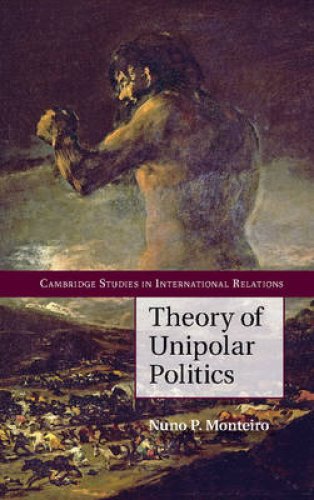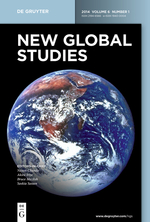
Nuno P. Monteiro. Theory of Unipolar Politics (Cambridge Studies in International Relations), April 2014. 260 pages. R$51,08 eBook Kindle (www.amazon.com.br)
http://www.degruyter.com/view/j/ngs.ahead-of-print/ngs-2015-0009/ngs-2015-0009.xml
New Global Studies. ISSN (Online) 1940-0004, ISSN (Print) 2194-6566, DOI: 10.1515/ngs-2015-0009, May 2015

In Theory of Unipolar Politics, Nuno Monteiro addresses three questions about unipolarity. First, is it durable? Second, is it peaceful? And third, what is the best grand strategy that a unipolar power such as the United States can implement? His book thus seeks to provide the first coherent theory to explain unipolarity, filling an important gap in the international relations literature.
The world has witnessed US-led unipolar order for the past two decades, yet the concept and its consequences remain hotly contested. There are prominent voices who believe unipolarity will endure, yet equally important analysts promise that it is about to end. In the same way, there is no consensus about whether unipolarity is more or less peaceful than multipolarity. It does not help that the discipline of international affairs is dominated by thinkers based at US universities and think tanks, essentially looking at the world from a hegemon’s perspective. Our limited knowledge about unipolarity is dangerous, the author warns: After all, “unipolarity is the background against which many of the most important political questions of the next few decades will be decided.”
While the book’s ambition is broader, Monteiro’s analysis will be of great interest to those engaged in the discussion about China’s rise and the future of global order – a debate that is often limited to the question about whether China will or not overtake the United States economically. Most believe that military power inevitably derives from economic power, so China’s economic rise is a mere precursor to its military dominance and hegemony. Yet the author claims that military power is not a side product of economic development, but the result of a state’s decision to invest a fraction of its wealth into the production of military capacities. China could very well become the largest economy on earth without seeking global military dominance. Analysts of international affairs should therefore refocus their analysis from the determinants of economic growth to those of militarization.
Thus, looking at the situation from a theoretical perspective, the question Monteiro asks: Does unipolarity create incentives for rising powers to militarize? How does the unipole’s behavior affect the decision-making process of each rising power?
His response is that whether emerging powers such as China will continue to balance past the point at which their survival is ensured by a robust nuclear deterrent depends on whether the unipole accommodates their economic growth. If that is the case, rising powers have no incentive to continue balancing past that point. If, on the other hand, the unipole takes actions that contain the economic growth of potential competitors, then the latter have an incentive to continue balancing, ultimately leading to the end of unipolarity. Put differently, unipolarity is durable if the hegemon wants to.
Monteiro’s second argument is that the structure of a unipolar world does not have a clear beneficial impact on the overall prospects for peace – although it eliminated the prospect of great-power competition. That is because unipolarity allows for frequent conflicts between the hegemon and recalcitrant minor powers and conflict among small powers, which are less likely to be kept in line by great-power allies, as would be the case if an overall balance of power was present. Hence, he convincingly argues, unipolarity is prone to witness asymmetric and peripheral conflicts.
These findings have important consequences for both academics and policy makers. Since unipolarity is not any more benign an international system than bipolarity or multipolarity, it is far from certain whether the maintenance of today’s unipolar order should be a goal of US foreign policy. Put differently, it is simply not clear whether unipolarity in a nuclear age is better — for both the United States and the world — than other types of order (it is important to note here that Monteiro’s arguments are absolute, not relative, i.e. he does not compare unipolarity with other types of international systems).
One possible criticism of Monteiro’s approach is to argue that unipolarity has actually already ended, pointing to the Crimean Crisis, where the United States seems unwilling or unable to limit Russian aggression. In the same way, skeptics will say that the United States three big projects of the first decade of the 21st century — stabilizing Iraq, stabilizing Afghanistan and winning the War on Terror — have all failed rather spectacularly.
Analysts outside of the realist camp are certain to be skeptical of Monteiro’s argument that new great powers are unlikely to emerge because nuclear weapons guarantee the survival of any major power that possesses them, and that no great power will rise as long as the United States will accommodate their economic growth.
They will argue that a rising and perhaps increasingly nationalistic China will not accept U.S. military dominance in the long term, especially once its economy will be significantly larger than that of the United States. What will policy makers in China respond to nationalistic agitators who point out that US-American destroyers routinely cruise only a few miles off the Chinese coast, suffocating even the slightest Chinese effort to exert strategic influence in its immediate neighborhood? After all, no aspiring great power gains status or self-respect by ceding responsibility for security in its backyard to a foreigner from far away. Some China watchers will respond that it is merely a question of time that the Middle Kingdom will, after the “century of humiliation”, seek to reclaim its rightful spot as the world’s leading power.
A related question is that whether the rest of the world will accept the United States as the legitimate provider of security once China will increasingly dominate the world economically and, as a consequence, wield growing influence in the domestic political affairs of other countries – consider South Africa, that refuses to issue a visa to the Dalai Lama.
Finally, once the United States’ GDP and economic influence in global affairs will be significantly smaller than that of China, how will policy makers in Washington, D.C. convince voters worried about health care, education and infrastructure to support maintaining more than 1000 military facilities scattered over more than 140 countries, in which more than 200,000 military personnel are stationed? What will they respond to those who argue for systematic retrenchment (as already happens now), or those who say that China should finally “step up to the plate” and start providing international security?
There is an aggravating factor that will dramatically increase pressure on U.S. policy makers to bring the troops home permanently: Monteiro confidently predicts that the significant level of conflict and U.S. military action the world has witnessed over the last two-and-a-half decades will continue for as long as U.S. power remains preponderant. There is little the United States can do to avoid this: any military strategy by the unipole – engagement or disengagement – will set in motion specific paths leading to confrontation and, quite frequently, war. Unipolarity, the author writes, “is a damned-if-you-do, damned-if-you-don’t situation, in which conflict is hardly avoidable.” Technological advances (drones, etc.) may reduce the political cost of U.S. warfare – and indeed, many US-Americans are not even aware of the fact that the U.S. military is at war in places such as Pakistan and Yemen. Yet there are few signs that technology will do away with the messy, expensive and bloody conflicts the United States engaged in in Iraq and Afghanistan during the past decade. Frequent wars – even undeclared ones – are certain to generate considerable costs and will thus be vulnerable to budget hawks, particularly during economic difficulties.
The author recognizes the dangers of nationalism in China – especially in a potentially democratic China – yet still believes that even a nationalist leader would consider the cost of global military competition with the United States as prohibitively high.
Regarding Washington’s strategy, Monteiro responds that if the costs of exercising dominance override the benefits unipolarity brings, then disengagement will indeed be attractive to policy makers in the United States.
Yet the author cautions that there is no easy way out for the United States – if it opts for disengagement, it will pay the competition cost by triggering major-power balancing and putting an end to the economic benefits that flow from its global power preponderance. “The best rational strategy for the United States”, he reasons, “will therefore depend on the relative magnitude of the resulting competition and conflict costs”. Yet he warns that disengagement would unleash regional pressures for conflict and nuclear proliferation beyond the unipole’s region.
Still, it all comes down to whether the economic benefits of power predonderance exceed the cost generated by military conflict the United States has to engage in to maintain its dominant position. According to Monteiro, as long as the U.S. pursues a strategy of defensive accommodation (maintaining its dominant position but allowing rising powers to grow economically), the advantages of U.S. military power preponderance far outweigh the conflict costs – pointing out that defense spending over the past two decades never exceeded 5% of GDP (no more than during bipolarity).
Therefore, Monteiro expects the current U.S. preponderance in conventional military power to remain largely unchanged for “as far as the eye can see” even if the United States loses its status as the world’s largest economy.
Theory of Unipolar Politics is a challenging read, yet is profoundly rewarding as it provides the reader with an extremely useful guide and a nuanced understanding of unipolarity and the dynamics that shape it.
—-
Read also:
2040: US military supremacy vs Chinese economic leadership
Book review: “China Goes Global: The Partial Power” by David Shambaugh
Book review: “Liberal Internationalism: Theory, History, Practice” by Beate Jahn
Book review: “The End of American World Order” by Amitav Acharya








